
Wednesday, August 6
1:15 pm
Opening Keynote: Trade and tariff impacts on agriculture

Moderator: Gregg Doud
President and CEO, National Milk Producers Federation
2:15 pm
Industry Keynote: The value of mentors
The opportunity to be a first-generation feedlot owner would not have been possible without the help of a great mentor. I will share the lessons learned that have helped lead to our success.
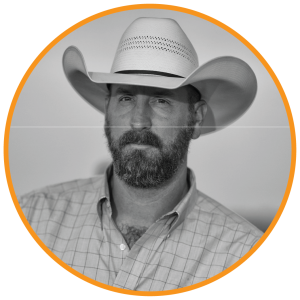
Shane Tiffany
CEO/Owner Tiffany Cattle Company
Panel: Alfalfa grower perspective
Several growers from diverse farming operations will discuss their alfalfa operations and how they address the current economic challenges in keeping their operations profitable.

Moderator: Don Miller
Forage Technical Consultant | Mountain View Seeds
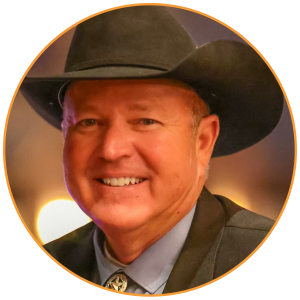
Panelist: David Buss,
Owner/Operator of Buss Farms, Hunter, OK

Panelist: Clayton Janicke
Farmer from Cheyenne County
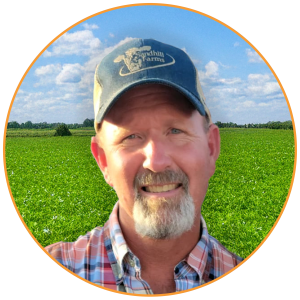
Panelist: Tim Peterson
Farmer/Rancher

Panelist: Drew Thompson
Thompson Farms – Partner/manager
It’s a process: Transitioning to Regenerative Agriculture
This session will discuss the challenges and successes of transitioning from a full tillage operation to a no-till regenerative agriculture operation.
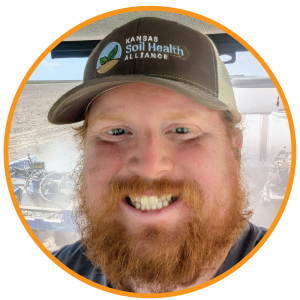
Tyler Johnson
Farm Manager at Johnson Family Farms
Bushels, Bleachers and Burnout
This honest, yet upbeat, session will cover what it really looks like to manage a busy farm, raise kids, run a business and prioritize mental health.

Janna Splitter
Co-Owner, Splitter Farms
3:15 pm
Uncovering alfalfa’s hidden yield
Take a dive into what we can do to help uncover the yield potential alfalfa has. What are some of the current management practices and stressors that are holding yields back.
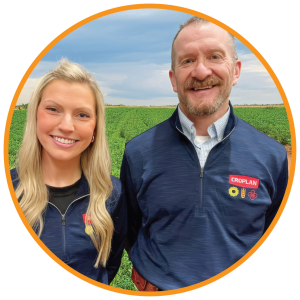
Jeff Jackson & Leta Larsen
Alfalfa/Forage Specialists | CROPLAN
Adama DoubleTeam Sponsored Session
Advances in forage sorghum – water savings and quality
Forage sorghum uses less water and is more drought tolerant than corn when used for silage. Advancements in grain processing technology greatly improve starch availability. Male sterile hybrids are an alternative for those wanting high quality forage with little grain.

Brent Bean
Director of Agronomy, United Sorghum Checkoff
Emerging diseases in bovine health-Asian Longhorned Tick, New World Screwworm, and others
Learn more about emerging threats to cattle health, including the Asian Longhorned Tick and New World Screwworm. Identification, prevention, and control strategies will be discussed.
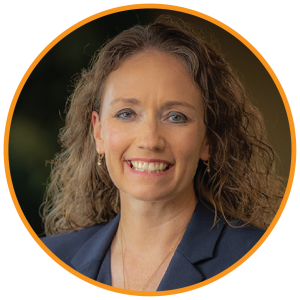
Dr. Rosslyn Biggs, DVM
Director of the Center for Rural Veterinary Medicine | Beef Cattle Extension Specialist, Oklahoma State University
4:15 pm
Top 10 Things to Know About Backgrounding Nutrition
Learn more about the major aspects of backgrounding nutrition and management with a focus on maximizing value and returns.

Dale Blasi
Professor, Beef Cattle Nutrition, Kansas State University
How to pick the best alfalfa variety for your production needs
The presentation will identify which alfalfa traits have the greatest impact on stand life, forage yield and quality. Alfalfa Producers can use this knowledge in variety selection to increase the profitability of their alfalfa production.

Don Miller
Forage Technical Consultant | Mountain View Seeds
Ranch Business Development – Diversifying Income Streams
Whether you are looking for conventional ways to bring new income into your operation, or looking at non-traditional ways, this session gives a unique perspective on utilizing both and offering things that your area may not have or even need.
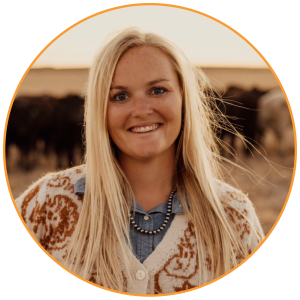
Lettie Nickell
4th Generation Farmer, Rancher and Entrepreneur
5:15 pm
Panel: The toolbox to manage Chinch bugs
Managing chinch bug infestations in sorghum production can be a pest. This panel discussion covers the farmer’s toolbox to manage chinch bug at the field gate from field agronomy to emerging tolerant genetics.

Moderator: Sarah Sexton-Bowser
Director, Center for Sorghum Improvement

Panelist: Brent Bean
Director of Agronomy, United Sorghum Checkoff

Panelist: Sandeep Marla
Research Manager, Dept. of Agronomy, Kansas State University

Panelist: Brian McCornack
Entomology Professor, Kansas State University
Livestock risk management and insurance options
The goal of this session is to help livestock producers decide whether existing insurance options are a good fit for their risk management needs. We will begin with an overview of livestock and forage risk management strategies, followed by an overview of insurance options. Next, examples of Livestock Risk Protection (price insurance) and Forage Insurance will be discussed.

Jennifer Ifft
Professor and Flinchbaugh Agricultural Policy Chair, Kansas State University
Defending grasslands with satellites, strategy, and stewardship
Attend this session to learn how new technologies are enabling large-scale monitoring of the woody encroachment threat in Great Plains grasslands. Armed with data and an improved understanding of grassland vulnerability, participants will step away with better strategies to combat this serious threat. Join the collective effort known as the Great Plains Grassland Initiative (GPGI), a rancher-driven, science-informed, and agency-supported effort, to conserve the last remaining iconic grassland regions in the Great Plains biome.
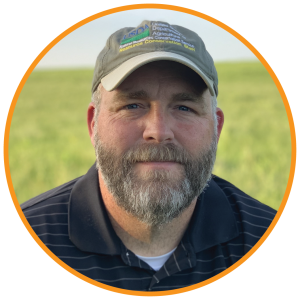
Doug Spencer
State Grazing Specialist, USDA-NRCS
Welcome Reception to Follow
Sponsored by CROPLAN
Thursday, August 7
8:00 am
Panel: Marketing your cattle for the highest bid
The cattle marketing panel will take a look at cattle marketing trends at the moment with emphasis the best ways to add value and capitalize on sky high prices.

Moderator: Jason Warner
Extension Cow-Calf Specialist, Kansas State University

Panelist: Barrett Broadie
Superior Livestock Representative
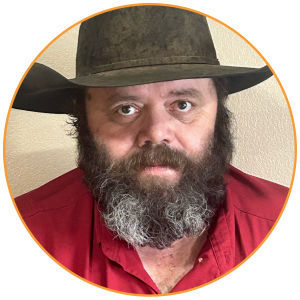
Panelist: Layne Konkel
Beaver County Stockyard – Beaver, Oklahoma
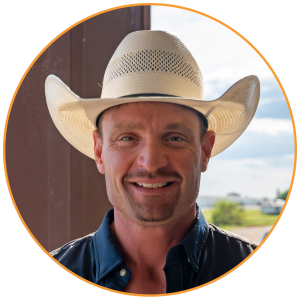
Panelist: Skyler Moore
Owner- Joplin Regional Stockyards
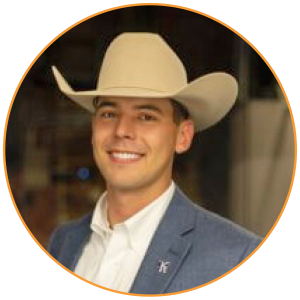
Panelist: Barrett Simon
Auctioneer – Fairview Livestock Commission / Eureka Livestock Sales
Panel: High yield success: Commodity growers share lessons learned
This panel will be made up of growers who have found success in high yield contests. They will share insights and give advice on pushing the envelope with yield on wheat, sorghum, corn and soybeans.

Moderator: Dave Deken
Owner, AgNow Media LLC

Panelist: Darwin Ediger
Co-Owner, Ediger Farms and Ediger Seed LLC

Panelist: Alex Noll
Farmer/Owner Operator
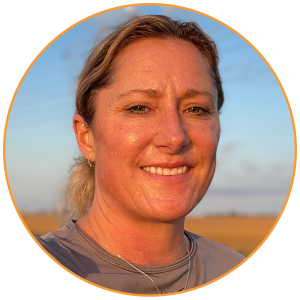
Panelist: Amy Peterson
Co-Owner, Winsome Farms

Panelist: Rod Stewart
Co-Owner, Stewart Family Farms LLC
9:00 am
Industry Keynote: Drought-resilient alfalfa varieties and deficit irrigation management strategies
Drought and limited irrigation resources regularly reduce alfalfa production throughout the Great Plains and western regions of the U.S. Ian Ray will discuss development of drought-resilient alfalfa varieties selected to recover from prolonged periods of drought stress, and which generate high yields when adequate irrigation is available. If you have limited water resources, irrigation management strategies that can be used on those new varieties will also be discussed.

Ian Ray
Emeritus Professor of Agronomy (retired), New Mexico State University
BQA training – Beef Quality Assurance Certification: Our pathway to continuous improvement
PART 1: This is your opportunity to obtain your BQA Certification (good for 3 years). This first session will share up to date best management practices for the Beef industry to pave the way for continuous improvement. You’ll need to attend both Part 1 and Part 2 to obtain certification.

Dr. AJ Tarpoff
Beef Extension Veterinarian, Associate Professor. Kansas State University
Moving the fences back in HRW wheat breeding for a better consumer experience
Consumers are looking for cleaner and healthier ingredients across the grocery store including the bread aisle. Innovation in the baking sector can be bolstered by innovation in wheat breeding programs. Two such examples will be provided such that HRW flour can serve as an all-natural additive ingredient to commodity bread flour. These include recent development of “Ox” wheat varieties with highly unique and value-generating dough strength profiles, and pigmented-bran varieties with certain phytochemicals known to confer numerous human health benefits when otherwise present in fruits and vegetables.

Brett Carver
Regents Professor, Wheat Breeding and Genetics, Oklahoma State University
10:00 am
Where to cut inputs without yield loss
With tight economies we have to be tight with our budgets. There are many places that we can become more efficient on our inputs without the loss of yield. But there are inputs we should not take for granted. This session will walk through concepts of where there is some input “fat” to trim, and those not to skip on.

Brian Arnall
Precision Nutrient Management Specialist, Oklahoma State University
BQA training – Beef Quality Assurance Certification: Our pathway to continuous improvement
PART 2: In this second and final session, you will be able to have the opportunity to obtain your BQA Certification (good for 3 years). You must have attended Part 1 prior to, to obtain certification.

Dr. AJ Tarpoff
Beef Extension Veterinarian, Associate Professor. Kansas State University
Diverse forages and the opportunities they bring using regenerative management
Utilizing a mix of warm and cool season grasses, native forbs, cover crops, introduced grazing crops and stockpiled forages, a livestock producer has abundant grazing opportunities throughout the year. Most producers have a dominant forage around which they need to build their grazing system. Identifying other forage sources, adding livestock enterprises, and extending grazing seasons can help spread risk and create opportunities for innovative management. Regenerative management offers an opportunity to diversify your grazing.

Steve Swaffar
Regenerative Ranching Advisor at Noble Research Institute
11:00 am
Panel: Farm and Ranch Advocacy
This panel will include a discussion on how women can become more involved with leadership, promotion and advocacy of agriculture.

Moderator: Maddy Meier
Director of Communications and Outreach, Kansas Grain Sorghum Commission

Panelist: Jacquelyne Leffler
Leffler Prime Performance

Panelist: Lettie Nickell
Farmer and Rancher
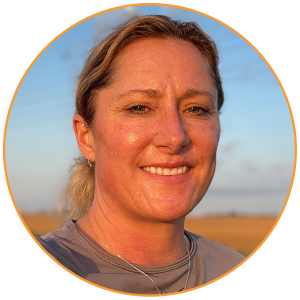
Panelist: Amy Peterson
Co-Owner of Winsome Farms

Panelist: Janna Splitter
Co-Owner – Splitter Farms
Disease Management: Wheat Streak Mosaic Virus
This session will revisit the disease complex, factors that contributed to the 2025 outbreak and key management options.

Kelsey Anderson-Onofre
Assistant Professor, Wheat Extension Specialist, Kansas State University
Alfalfa weevil and other competitors for the alfalfa crop
Alfalfa weevils are possible to control, but persistence and dedication are needed. Learn how their control relates to other insects commonly found in alfalfa

Jeff Whitworth
Extension Specialist-Entomology, Kansas State University
Using DNA to make sound breeding decisions
My take-away is to not be intimidated with DNA results. In most cases DNA is hard to interpret and knowing what to do with the results can be challenging. I want to talk about learning what to do with the results.
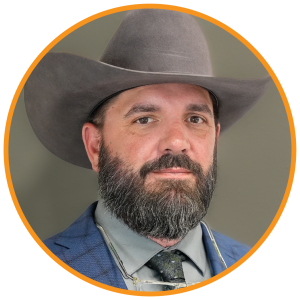
Cody Jorgensen
Partner at Jorgensen Land & Cattle
12:00 pm
Noble Research Sponsored Lunch & Learn
Soil Health = Better Grazing
Managing and feeding the soils is vital to managing forages and feeding your livestock. Soil communities are the cyclers and recyclers of your livestock systems’ energy, nutrients and water. Ensuring your grazing patterns and management practices efficiently feed and protect the soil throughout the year can improve your forages, ultimately producing higher-quality, healthier livestock.

Steve Swaffer
Regenerative Ranching Advisor at Noble Research Institute
Industry Keynote: Five steps towards your farm’s future
Nearly two thirds of U.S. farms and ranches haven’t put the tools in place to ensure their operation makes it to the next generation in tact. How can you and the other key stakeholders of your farm take five steps toward the future? This session presents a five-step process for farm transition planning with concrete actions you can take right now to give the next generation the very best chance of success as it takes the reins. We will discuss how to conduct an inventory of assets and stakeholders, how to have “the talk” with everyone involved, how to identify key obstacles and opportunities as your business transitions, what essential tools need to be part of your estate planning, and how to evaluate, revise, and keep moving forward with all your transition plans.

Shannon Ferrell
Professor of Agricultural Law – Oklahoma State University Department of Agricultural Economics
1:45 pm
Beef cattle situation & outlook
This session will provide an overview of the beef-cattle market situation here in 2025 and an outlook for the next few quarters. Extended discussion will likely include depth on beef demand and herd expansion status.

Glynn Tonsor
Kansas State University
Fireside Chat: Expanding markets in sorghum
Join us for a candid fireside chat exploring the latest efforts to expand domestic and international markets for U.S. sorghum. Industry leaders will discuss trade opportunities, biofuel demand, and strategies to boost long-term market growth.

Tim Lust
CEO- National Sorghum Producers

Craig Meeker
Past Chair- National Sorghum Producers
HB4 Wheat – A rare opportunity for the US wheat industry
This session will review the current regulatory status of HB4 wheat in the United States and globally. We will discuss steps being taken in the industry to integrate the trait into adapted genetics, market considerations for domestic and international buyers of wheat, and timelines for eventual commercialization.

Brad Erker
Executive Director, Colorado Wheat

Dusti Gallagher
President/CEO, Heartland Plant Innovations

Dalton Henry
Vice President of Policy – U.S. Wheat Associates
2:45 pm
Flower Farming in the Nooks and Crannies
This presentation will uncover how flowers can be so much more than bedding plants in your flower beds.

Rachel Tucker
Farmer Florist
Biologicals for the High Plains: Do they have a place in semi-arid environments?
This presentation will walk through and discuss the modes of action of the most common biological products in the marketplace. Also, in the presentation the results of several studies conducted across many crops including multi-state project, which evaluated a group of products across the entire cotton belt over the 2023 and 2024 production seasons.

Brian Arnall
Precision Nutrient Management Specialist, Oklahoma University
Hay Market Update: Diversity in alfalfa
This class we will dive into the diversity of marketing alfalfa. Establishing 3 key markets to your business.

Jordan Garrett
Self Employed Farmer/ Co-owner SWMO Hay Auction
3:45 pm
Rooted in Purpose: The Why and How of Ag Education
Discover the power of Agriculture Education and how you can make a lasting impact on youth. This session will include practical tips for delivering meaningful lessons to leave inspired and equipped to educate the next generation of Ag.

Shannon Martin
Assistant Director of Ag Education and KFB Foundation, Kansas Farm Bureau
Evaluating fungicides and cropping system practices for sorghum stalk rot management in Kansas
Stalk rots are among the most damaging diseases affecting sorghum production in Kansas, leading to weakened stems, lodging, and at least 5% yield loss annually. Fusarium stalk rot (Fusarium spp.) and charcoal rot (Macrophomina phaseolina) are the most common stalk rot diseases in sorghum. Growers currently rely on a limited pre-planting management practices, including hybrid selection and avoiding high plant populations. Thus, in this study we evaluated the effects of fungicides and cropping system practices on sorghum stalk rot.
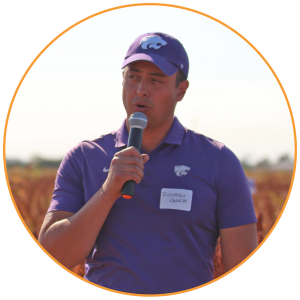
Rodrigo Onofre
Specialist, Row Crops Pathologist, Plant Pathology Department, Kansas State University
Panel: Farm marketing and grain storage dynamics in an everchanging environment
Commodities markets gyrate with weather, fundamentals, policy announcements, global disruptions and challenges in the supply chain. This panel will dig into the market dynamics to give guidance on farm marketing and the grain storage situation.

Moderator: Ken Eriksen
Managing Member and Strategic Adviser, Polaris Analytics and Consulting

Panelist: Guy Allen
Senior Economist, IGP Institute, Kansas State University

Panelist: Scott Sartor
Founder/CEO of Croptell
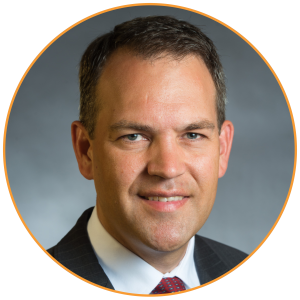
Panelist: Mike Steenhoek
Executive Director, Soy Transportation Coalition
Old MacDonald Had a Wind / Solar / Battery / Server Farm: The Intersection of Agriculture and Energy in the 21st Century
With U.S. electrical demand predicted to grow another 50% by 2050, America needs electrical generation sources and the wires to carry that power to where it’s needed. With wind and solar currently the cheapest form of power generation, there continues to be strong interest in the leasing of agricultural land for energy projects. Battery storage and data centers are also trying to locate next to renewable generation. All this means producers face a lot of new opportunities and potential challenges. This session will explore the state of the industry and how producers can negotiate win-win agreements for energy development on their land.

Shannon L. Ferrell
Professor of Agricultural Law – Oklahoma State University Department of Agricultural Economics
5:00 pm
Farm Bill and Agricultural policy update

Jennifer Ifft
Professor and Flinchbaugh Agricultural Policy Chair, Kansas State University
Attendee Reception to Follow with Inaugural HPJ Live Award Announcements
Awards Sponsored by Hy-Plains Feedyard
Friday, August 8
8:00 am
Industry Keynote: Growing a regenerative farm: An honest look at the adaptation of regenerative ag practices
This presentation delves into the realities of growing a regenerative farm. We’ll explore how agricultural practices are carefully adapted to foster soil health and biodiversity. This session will provide an honest look at the challenges and successes encountered during the transition to regenerative methods, highlighting key strategies for sustainable growth.

Steven Tucker
Regenerative Farmer – Tucker Farms
9:00 am
Cropland livestock integration and soil health impacts
We will talk about our experiances with integrating livestock into our cropland and the short term and long term impacts on soil health.

Bryan Jorgensen
Chief Agronomy Operations Officer, Jorgensen Land & Cattle
10:30 am
From Data to Decisions: Interpreting Your Soil Health Sample Results
Sponsored by Ensoil Algae
This session will guide you through the process of analyzing your soil health sample results. Soil health reports contain a lot of information, which can be overwhelming. We’ll help you identify key insights and determine the next actionable steps based on your results.

Noah Goza
FarmComp Manager – Heartland Soil Services
11:30 am
Panel: Sustainable cover crop rotations
Sponsored by JP Weigand

Moderator: Steven Tucker
Regenerative Farmer – Tucker Farms

Panelist: Ben Cramer
Owner/Operator C4 Ag, LLC
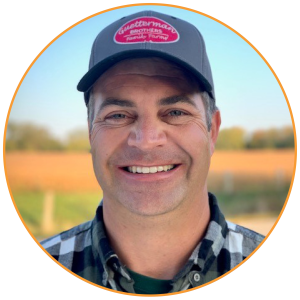
Panelist: Nick Guetterman
Farmer

Panelist: Scotty Herriman
Owner/Operator of Herriman Farms

Panelist: Zach Louk
Senior Sales Representative and Seed Purchasing Lead
LUNCH:
Sponsored by JP Weigand
Soil Health Roundtable Discussion
During this Q&A session, attendees will have the opportunity to ask our soil health speakers questions about regenerative agriculture and delve deeper into the subjects covers during HPJ’s soil health education.

Noah Goza
FarmComp Manager – Heartland Soil Services

Tyler Johnson
Farm Manager at Johnson Family Farms

Bryan Jorgensen
Chief Agronomy Operations Officer, Jorgensen Land & Cattle

Steven Tucker
Regenerative Farmer – Tucker Farms